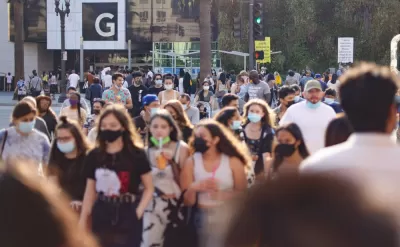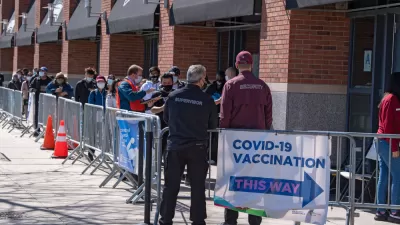Although the survey collects data from a small sample, it looks like North American planners don't expect the pandemic to change much about the way cities are planned.

A recent survey indicates that planners don't intend to change much in their approach to urban planning, despite the various disruptions and influences of the Covid-19 pandemic.
Researchers at the University of Waterloo in Canada surveyed 98 city planners (after disseminating the survey via the Canadian Institute of Planners Newsletter, the American Planning Association's Interact newsletter, and various planning-related social media groups) about the future of planning in mid-sized urban areas as a response to the Covid-19 pandemic, publishing the results in the Planning Practice & Research journal (the study is currently available in full online) in December.
"Despite calls for greater creativity and innovation, there is essentially no difference between what planners viewed as more important to downtowns pre-and-post the pandemic," says Pierre Filion, an emeritus professor in the School of Planning at Waterloo, as quoted in an article by David Malone for Building Design + Construction that shared news of the new research.
Like the public and the media, the surveyed planners are certainly aware of the negative effects of the pandemic. Among the study respondents, 60% "indicated that the pandemic had a substantial negative effect on downtowns," according to the study. "The survey respondents perceived that the most severe effects of the pandemic were experienced by eating and drinking establishments, with substantial negative effects being reported by more than 75% of the respondents."
Yet, the survey did not reveal that planners expect to produce a commensurate response in the form of reform and innovation. From the discussion of the journal article:
The survey findings reveal a disconnect regarding planner’s perceptions of the drivers of downtown recovery after Covid. On the one hand, despite calls for greater creativity and innovation, there are essentially no differences between what planners viewed as important to downtowns pre-and-post the pandemic. This suggests that they are not ‘planning’ on fundamental changes to past practice even in the face of a changing reality, or a ‘new normal.’
The full Planning Practice & Research article can be found at the link below.
FULL STORY: Planning for Post-pandemic Downtowns of Mid-size Urban Areas

Alabama: Trump Terminates Settlements for Black Communities Harmed By Raw Sewage
Trump deemed the landmark civil rights agreement “illegal DEI and environmental justice policy.”

Planetizen Federal Action Tracker
A weekly monitor of how Trump’s orders and actions are impacting planners and planning in America.

The 120 Year Old Tiny Home Villages That Sheltered San Francisco’s Earthquake Refugees
More than a century ago, San Francisco mobilized to house thousands of residents displaced by the 1906 earthquake. Could their strategy offer a model for the present?

In Both Crashes and Crime, Public Transportation is Far Safer than Driving
Contrary to popular assumptions, public transportation has far lower crash and crime rates than automobile travel. For safer communities, improve and encourage transit travel.

Report: Zoning Reforms Should Complement Nashville’s Ambitious Transit Plan
Without reform, restrictive zoning codes will limit the impact of the city’s planned transit expansion and could exclude some of the residents who depend on transit the most.

Judge Orders Release of Frozen IRA, IIJA Funding
The decision is a victory for environmental groups who charged that freezing funds for critical infrastructure and disaster response programs caused “real and irreparable harm” to communities.
Urban Design for Planners 1: Software Tools
This six-course series explores essential urban design concepts using open source software and equips planners with the tools they need to participate fully in the urban design process.
Planning for Universal Design
Learn the tools for implementing Universal Design in planning regulations.
Clanton & Associates, Inc.
Jessamine County Fiscal Court
Institute for Housing and Urban Development Studies (IHS)
City of Grandview
Harvard GSD Executive Education
Toledo-Lucas County Plan Commissions
Salt Lake City
NYU Wagner Graduate School of Public Service





























